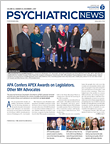Physicians participating in the Medicare program will see an overall increase in reimbursement of 0.41 percent next year, according to the 2018 Medicare Physician Fee Schedule Final Rule, released last month.
The fee schedule establishes a base rate of reimbursement for Medicare services. The “update” of 0.41 percent represents an increase in the base rate payment across all physicians participating in the program.
Whether any one participating clinician sees an increase depends on many factors, but participating psychiatrists could see a slight increase in reimbursement next year due to changes in the practice expense component of their reimbursement, according to APA staff. (The Medicare payment formula combines “physician work,” or complexity of services provided; “practice expense,” reflecting the cost of running a practice; and “malpractice expense.” These three factors are adjusted for geographic variation.)
Every year the Centers for Medicare and Medicaid Services (CMS) reviews several hundred CPT codes used by physicians to receive reimbursement for the services they provide. Recommendations from the AMA Relative Value Scale Update Committee (RUC) are critically important to the valuation of services.
Under the Medicare Access and CHIP Reauthorization Act (MACRA) of 2105, Congress repealed the sustainable growth rate component of the payment formula, which for years required increasingly large cuts to physician reimbursement. The slight increase next year reflects the new system under MACRA; however, MACRA also established the Merit-Based Incentive Payment System (MIPS), which provides participating physicians incentive payment over and above the base rate for meeting certain quality standards (see story above).
Importantly, last year CMS approved new payment codes for primary care practices using the Collaborative Care Model (CoCM). That model employs psychiatrists as consultants, and those psychiatrists are reimbursed for their consultative services as part of a bundled payment.
According to the new fee schedule, payment for CoCM services in office-based practices will increase by approximately $18 for the initial month and $2.50 a month for subsequent care. The rule also established new codes for CoCM to replace the temporary codes now in place for those services. The new codes are 99492, 99493, and 99494.
Additionally, CMS finalized its proposal to allow Federally Qualified Health Centers (FQHCs) and Rural Health Clinics (RHCs) to receive separate payments for CoCM services, starting January 1, 2018. The payment for CoCM services is approximately $145 (the average of the payment for the initial visit and subsequent visits).
CMS has included payment for CoCM in the definition of “primary care services” that lead to assignment of beneficiaries to a Medicare accountable care organization (ACO). This may help encourage ACOs to adopt the CoCM.
CoCM, developed by the late Wayne Katon, M.D., Jürgen Unützer, M.D., M.P.H., and others at the University of Washington, extends psychiatric expertise to primary care patients through the employment of a psychiatrist as a consultant working with a behavioral health care manager in the primary care setting. APA is one of just 39 organizations chosen to participate in the Transforming Clinical Practice Initiative. As part of this initiative, APA was designated a Support and Alignment Network and given a $2.9 million, four-year federal grant from CMS to train 3,500 psychiatrists and primary care physicians in the principles and practice of collaborative care. About 1,800 psychiatrists and primary care physicians have been trained to date.
APA was instrumental in advocating for the creation of payment codes for the CoCM and for its valuation resulting in the 2018 increases.
Additionally, the final rule establishes permanent codes and a payment valuation for “Behavioral Health Integration” (BHI) models of care other than CoCM that also include core service elements such as systematic assessment and monitoring, care plan revision for patients whose condition is not improving adequately, and a continuous relationship with a designated care team member. These models may not necessarily involve a psychiatric consultant or a behavioral health care manager. CMS expects to refine this code over time, as more information becomes available regarding other BHI care models in use. ■
